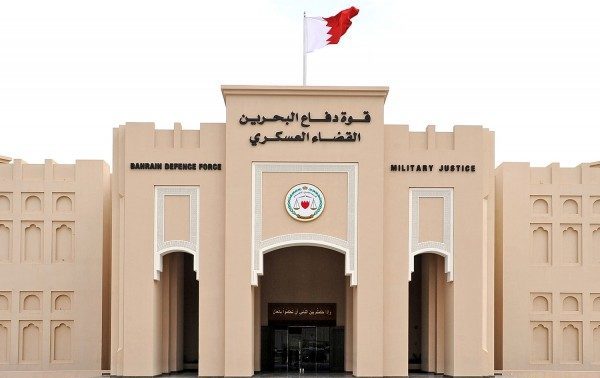Bahrain’s highest military court has again adjourned the appeal of seven men – one soldier and six civilians – convicted for the alleged “formation of a terrorist cell and committing several terrorist crimes” after an unfair trial marred by reports of torture, enforced disappearance and other due process violations. The Military Court of Cassation announced that the proceedings, referred to by the government as “Terrorist Cell Case 1/2017” or “Terror Case/2017/1,” will resume on 25 April 2018, when it will render the final verdict. This marks the defendants’ last opportunity for domestic legal remedy, barring a royal pardon.
The seven defendants were among the 18 men – one soldier and 17 civilians – tried in Bahrain’s first military hearing for civilians since the temporary National Safety Court system established in 2011. On 25 December 2017, following the April 2017 constitutional amendment allowing the military judiciary to try civilians, the Military High Court of the Bahrain Defence Force (BDF) convicted 13 of the defendants, sentencing six men to death and a 15-year prison term: civilians Sayed Fadhel Abbas Hassan Radhi, Sayed Alawi Sayed Husain Alawi, Mohammed Abdulhassan Al Mutagahwi, Murtada Majeed Ramadan Alawi, and Habeeb Abdullah Hassan Ali; and the soldier, Mubarak Adel Mubarak Mahanna. It sentenced seven other defendants, including Mohammed Abdulhussain Saleh al-Shehabi, Mohammed Abdulwahid Mohammed al-Najjar, and Hussain Mohammed Ahmed Shehab, to seven-year prison terms. All 13 were also stripped of their Bahraini citizenship.
On 21 February 2018, the Military High Court of Appeal reduced the prison terms of two appellants – Hussain Mohammed Ahmed Shehab and Mohammed Yussef Marhoon al-Ajmi – but confirmed the six death sentences as well as the 13 denaturalization orders.
Four of the men sentenced to death – civilians Fadhil Alsayed Abbas Hassan Radhi, Sayed Alawi Sayed Husain Alawi, and Mohammed Abdulhassan al-Mutaghawi; and the soldier, Mubarak Adel Mubarak Mahanna – and three of the men originally sentenced to seven-year prison terms – Mohammed Abdulhussain Saleh al-Shehabi (though his was reduced to five years by the appellate court), Mohammed Abdulwahid Mohammed al-Najjar, and Hussain Mohammed Ahmed Shehab – are now appealing before the Military Court of Cassation. Notably, if the death sentences are confirmed, the four men will not be subject to their additional 15-year prison term and will be at imminent risk of execution.
Background:
Bahrain’s use of military courts to try civilians is in violation of the fair trial rights enshrined in both the Universal Declaration of Human Rights (Article 10) and the International Covenant for Civil and Political Rights (Article 14). In addition, it contravenes the spirit of the Bahrain Independent Commission of Inquiry recommendations, which stated in Recommendation 1720 that “fundamental principles of a fair trial, including prompt and full access to legal counsel and inadmissibility of coerced testimony, were not respected” by Bahrain’s military tribunals, and that such cases should be subject to civilian review. The government’s actions also explicitly violate recommendations that Bahrain accepted as part of its United Nations Universal Periodic Review process, which variably called on the authorities to ensure that civilians are never again tried in military courts.
Compounding the illegality of trying civilians before military courts, both the initial and appeal proceedings have been rife with other due process and human rights violations. Several defendants report that officials tortured them to extract confessions and some of the men sentenced to death – like Sayed Alawi and Fadhil Abbas Radhi – were also subjected to enforced disappearance. Eight defendants were convicted in absentia, as they had reportedly fled to Iraq and Iran, and at least two were minors at the time of the alleged offense or arrest. The court additionally “issued a decision banning the publication of any information, data or news by any audio-visual, electronic or written media.” In the initial trial, the authorities also prevented some defendants from meeting with a lawyer until the third hearing in November 2017.
Defendants tried or convicted by Bahrain’s military court system are also held by the BDF in military facilities, rather than civilian institutions – namely the al-Qurain Military Prison rather than the Ministry of Interior’s Jau Prison. The Bahraini military is extensively supported by the United States, which has partially predicated continued security assistance – including the Trump Administration’s multibillion-dollar arms deal in 2017 – on the understanding that the BDF is not explicitly involved in political repression, like the Ministry of Interior. In addition to politically motivated judicial harassment, this marks the BDF’s official return to domestic law enforcement activities and directly implicates it in violence against Bahraini civilians detainees for the first time since 2011.





